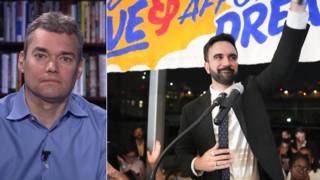HeadlinesJuly 05, 2018
Trump Administration Halts Obama-Era Affirmative Action Policies
The Trump administration is ending Obama-era policies calling on schools and universities to consider race as a factor in admissions, in the latest blow to affirmative action programs. The move comes as the Trump administration is reportedly planning a challenge to Harvard University’s admissions practices and as President Trump is nearing a decision on a Supreme Court nominee to replace retiring Justice Anthony Kennedy, who was long considered a swing vote on affirmative action.
Immigration Agents Taking DNA Samples from Separated Children
The Department of Homeland Security has been taking DNA samples of immigrant children as it separates them from their parents as part of the Trump administration’s “zero tolerance” border policy. CNN reports immigration officials have been swabbing DNA from the cheeks of children as young as 2 months old, without consent, ostensibly in a bid to later reunite children with their parents. Rights groups have condemned the move, saying it could allow the federal government to track young immigrants for the rest of their lives. Jennifer Falcon of the Texas immigrant rights group RAICES said, “This is a further demonstration of administration’s incompetence and admission of guilt, this further drives home the point we’ve been saying. They never registered parents and children properly.”
Trump Defends ICE Amid Furor over Anti-Immigrant Policies
This comes as President Donald Trump continued to praise the work of Immigration and Customs Enforcement—ICE—after a federal court ruled his administration may not arbitrarily detain people seeking asylum. Trump was speaking Tuesday at an event in West Virginia after U.S. District Judge James Boasberg ruled asylum seekers who have passed a credible fear interview should be given humanitarian parole, not indefinite detention.
President Donald Trump: “It is—it’s like you’re liberating a town. Like in a war, you’re liberating a town or an area. And ICE goes in there, and they go in there, and sometimes they have to go in swinging. They don’t mind. They’re tough. And then I hear Democrats saying, 'We want to abandon ICE. We want to abandon.' We’re not abandoning ICE, and we’re not abandoning our law enforcement. Just the opposite.”
Protesters Drop “Abolish ICE” Banner from Statue of Liberty
In New York City, police arrested seven activists Wednesday as they protested against family separations at the Statue of Liberty. The demonstration began with activists dropping a banner reading ”ABOLISH ICE” from the base of the statue. Police later arrested Patricia Okoumou, an immigrant from the Republic of Congo, who broke away from the main group and tried to climb the statue. Her action prompted police to order an evacuation of Liberty Island for several hours on the Fourth of July holiday. In a statement, the group Rise and Resist called for an immediate end to family separations, adding, ”ICE has proved to be a threat to our liberty and way of life, and should be abolished. They go after the most vulnerable among us, acting without due process to detain people. For-profit companies are making money off family separation. This has to stop now.”
Migrant Ship Docks in Spain After Denial by Italy and Malta
In Barcelona, Spain, an immigrant rights activist scaled a monument to Christopher Columbus Wednesday and placed a giant life vest on the statue’s arm reading, “Open Arms.” It was a protest against Italy’s new anti-immigrant government, which came as a ship carrying 60 migrants docked in Barcelona after the vessel spent days at sea when it was turned around by Italy and Malta, whose governments are cracking down on the influx of migrants crossing the Mediterranean from North Africa. Members of the group Proactiva Open Arms say they believe as many as 340 migrants have drowned at sea who might otherwise have been saved if their group had been allowed to complete its rescue operations. This is Open Arms spokesperson Mar Sebe.
Mar Sebe: “We decided to make this action to spread the word, to tell the people what’s happening and to tell the people that all human rights are on stage right now, and we have to really go out and defend.”
Syria, Russia Press Offensive as Ceasefire Talks Collapse
In Syria, Russian-brokered talks aimed at forging a ceasefire between anti-government rebels and Syria’s government have broken down, as the regime presses an offensive aimed at retaking parts of southern Syria. After truce talks collapsed Wednesday, Syria and Russia intensified airstrikes around Daraa, and advancing troops captured the town of Tafas near the Jordanian border. The United Nations says more than 270,000 civilians have fled fighting in Syria’s south over the last two weeks, with over 200 civilians killed. Human rights groups have demanded that Israeli and Jordanian authorities open their borders with Syria to allow fleeing civilians to apply for asylum.
Israeli Troops Assault Palestinians Ahead of Village Demolition
In the West Bank, Israeli soldiers assaulted dozens of Palestinian Bedouin villagers Wednesday who refused to leave their village near Israeli-occupied East Jerusalem. Video shows Israeli troops punching, kicking and dragging men, women and children, after Israel ordered bulldozers to begin demolishing the village, which is home to 180 people. The Red Crescent said the assault left 35 Palestinians wounded. Israel’s demolition of the village will clear the way for an expansion of Jewish-only settlement homes on occupied land—settlements that the United Nations has repeatedly said violate international law.
Britain: Scotland Yard Says Couple Poisoned by Russian Nerve Agent
In Great Britain, two people are in critical condition after they were exposed to what police say is the Russian nerve agent Novichok. The hospitalizations occurred just outside Salisbury—the city where four months ago ex-Russian spy Sergei Skripal and his daughter Yulia were exposed to Novichok in what Britain’s government has said was an attack orchestrated by the Russian state. This is Neil Basu of the British Metropolitan Police.
Neil Basu: “We can confirm that the man and woman have been exposed to the nerve agent Novichok, which has been identified as the same nerve agent that contaminated both Yulia and Sergei Skripal. The latest update we have from the hospital is that both patients remain in a critical condition. Both are British nationals and are local to the area.”
Police have cordoned off at least five different areas around where the poisonings occurred, though officials insist there’s little threat to the general public. Britain and its allies have condemned Russia over poisonings, calling it the first use of chemical weapons on European soil since World War II.
Poland: Judges Defy Retirement Order as Former President Warns of “Civil War”
In Poland, top judges are refusing to step down after the right-wing Polish government ordered a third of the Supreme Court to retire in what the European Union and other critics say is part of an authoritarian takeover of the judiciary. Thousands of protesters gathered outside the Supreme Court in Warsaw Wednesday to support the court’s president, who went to work in defiance of a new law lowering the retirement age of the Supreme Court from 70 to 65. This is former Polish President Lech Walesa, who joined Wednesday’s protests.
Lech Walesa: “It is getting serious when they ruin our courts. Sooner or later, this may lead to a civil war.”
AP: Donald Trump Pressed for Invasion of Venezuela in 2017
President Donald Trump repeatedly asked senior White House advisers in 2017 about the possibility of a U.S. invasion of Venezuela, in a bid to depose President Nicolás Maduro and his government. That’s according to the Associated Press, which reported Trump’s suggestion in August of last year that the U.S. invade Venezuela stunned both then-National Security Adviser H.R. McMaster and then-Secretary of State Rex Tillerson. The report drew condemnation from President Maduro, who warned Venezuela’s military to remain vigilant, saying, “You cannot lower you guard for even a second.”
Wildfires Grow in Colorado, California Amid Drought Conditions
In Colorado, the third-largest fire in the state’s recorded history continues to grow near Fort Garland, in the southern part of the state. The Spring Fire has so far consumed more than 100 homes and led to the evacuation of more than 2,000 people. In Northern California, warm temperatures and strong winds have fueled a fast-moving fire in rural Yolo County.
Heat Records Broken Globally, with 2018 Among the Hottest Years Ever
The fires come amid a sustained drought in parts of the western United States and as temperature records continued to tumble around the world. In Montreal, Canada, at least 12 people have died during a heat wave that’s seen the city post its highest temperature in recorded history—98 degrees. In Central Asia, Armenia’s capital posted a high of 108 degrees, while Tbilisi, Georgia, reached 105 degrees—breaking records for both cities, while southern Russia baked under record heat. And last week, a city in eastern Oman recorded the hottest low temperature ever observed—with sweltering overnight heat that bottomed out at 109 degrees. The scorching temperatures come as climate scientists say 2018 is on track to become one of the planet’s hottest years on record—possibly surpassing the past three years, which were the hottest ever recorded.
Indonesia: 34 Drown in Ferry Boat Disaster
In Indonesia, at least 34 people died after a ferry began capsizing Wednesday off the coast of South Sulawesi province. Witnesses say the boat’s captain intentionally ran the ship aground in an effort to save lives after it began taking on water. The accident came just weeks after an overcrowded ferry boat sank on a volcanic lake in Indonesia, killing more than 200 people.
Chile: 15-Year Sentences for Officers Who Killed Singer Víctor Jara
And in Chile, a court has handed 15-year sentences to eight former military officers for the murder of legendary folk singer and activist Víctor Jara in September 1973. In the days after dictator Augusto Pinochet seized power in a U.S.-backed coup, Víctor Jara was arrested, tortured and shot 44 times. He was one of thousands of leftist academics and activists rounded up in a soccer stadium in Santiago, which has since been renamed Víctor Jara Stadium.
Most popular
- 1
- 2
- 3
- 4
Non-commercial news needs your support
Please do your part today.












Media Options